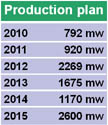Power production to rise to 9,426mw by 2015
Bangladesh Power Development Board (BPDB) will submit a proposal to Bangladesh Energy Regulatory Commission (BERC) in a month or two to increase the electricity prices.
“The BERC will decide the extent of rationalising the tariff,” Prime Minister’s Energy Adviser Tawfiq-e-Elahi Chowdhury told a press conference at the conference room of Press Information Department (PID) yesterday, amid increased cost of power generation due to quick rental projects.
Power secretary Abul Kalam Azad presented a power generation plan to gradually increase up to 9,426 MW by 2015 when State Minister for Power, Energy and Mineral Resources Enamul Haque and senior officials concerned were present.
He said the average power generation cost is Tk 2.80 per unit, higher than the average sales price of Tk 2.45. The loss would be even higher as the government was set to purchase expensive rental power at Tk 7.66 per unit in its desperate bid to improve the power supply.
According to an estimate, the average per unit price of electricity would be increased to over Tk 5.00 when the total plan would be implemented.
Azad told The Independent on the sidelines that the government would have to pay increased subsidy if the plan was implemented. He could not estimate in advance the extent of subsidy, but said it would depend on how much the tariff would be increased.
However, the government has a plan to increase the tariff by 12 percent every year, According to a PDB estimate, a subsidy of Tk 9,600 crore will have to be paid from the national exchequer if the total generation plan is implemented by 2015, even after raising the tariff.
Of the total power generation target, 792 MW is scheduled to be added to the national grid by the end of this year when the consumer is expected to see faster improvement in power supply. The PDB boss said the power supply would experience some “breathing space” by 2012 when there would be no load-shedding.
In 2011, the national grid is scheduled to get 920 MW while 2269 MW in 2012, 1675 MW in 2013, 1170 MW in 2014 and 2600 MW in 2015.
Under the plan, 1,000-1,200 MW of electricity would come through quick installation of rental power plants by the next year.
Replying to a question over awarding the contracts for rental plants, the power secretary said the Public Procurement Act (PPA) exempts direct purchase in “emergency situation” and “on apprehension of disastrous consequence” subject to approval by the Cabinet.
“The whole thing has been going through transparency and legal procedure,” supplemented PM’s adviser Tawfiq, brushing aside the allegations of corruption in the process of signing the deals on rental power plants.
“Only the corrupt people can smell rats… If you’ve specific allegation against any member of our family, do come with the documents,” he added.
Asked about the fuel arrangement for the proposed rental power plants, Bangladesh Petroleum Corporation chairman 2013, 1170 MW in 2014 and 2600 MW in 2015.
Under the plan, 1,000-1,200 MW of electricity would come through quick installation of rental power plants by the next year.
Replying to a question over awarding the contracts for rental plants, the power secretary said the Public Procurement Act (PPA) exempts direct purchase in “emergency situation” and “on apprehension of disastrous consequence” subject to approval by the Cabinet. “The whole thing has been going through transparency and legal procedure,” supplemented PM’s adviser Tawfiq, brushing aside the allegations of corruption in the process of signing the deals on rental power plants.
 “Only the corrupt people can smell rats… If you’ve specific allegation against any member of our family, do come with the documents,” he added.
“Only the corrupt people can smell rats… If you’ve specific allegation against any member of our family, do come with the documents,” he added.
Asked about the fuel arrangement for the proposed rental power plants, Bangladesh Petroleum Corporation chairman Anwarul Karim said the diesel consumption would be increased by 190,000 tonnes and furnace oil by 46,000 tonnes for the June-December period of this year.
He said BPC had undertaken measures to increase petroleum storage capacity by 200,000 tonnes by the year 2012 from existing capacity of 272,000 tonnes.




















